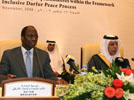
The U.N. Security Council is meeting today to discuss a recent report by United Nations Secretary General Ban Ki-moon on the peacekeeping force in Darfur. The report warned of the potentially grave impact nationwide of a stalled peace process for Darfur. "Without an inclusive and comprehensive peace agreement in Darfur, as South Sudan heads towards a referendum on its future status, there is a risk of increasing instability in Sudan,” the secretary general wrote. The report details numerous reasons why the process is faltering; however, media reports and impressions gathered from meetings and conversations suggest that leadership of the process is one of the major hurdles.
A senior official from the Sudan People’s Liberation Movement, Yasir Arman, recently announced that southern Sudanese President Salva Kiir has offered to serve as a mediator for the Darfur peace process. Arman stated that the president’s involvement had been invited by the A.U.-U.N. chief mediator, Djibril Bassolé, with the hope that his intervention could break the current deadlock. Although Arman asserts that Kiir is, “the only person who can talk to both parties,” signs thus far from Sudan’s ruling National Congress Party indicate that the idea will be rejected.
This latest development comes on the heels of a meeting called by UNAMID chief Ibrahim Gambari in El Fasher, North Darfur, in which tensions among the senior international principals to the negotiations were starkly revealed. While the meeting’s attendees included envoys from China, Russia, and the European Union (among others), as well as high level U.N. representatives, glaringly missing from the proceedings were the special envoys to Sudan from the U.S., the U.K., and France. Although these envoys all reportedly had genuine scheduling conflicts, there have been rumors that when they asked whether the meeting could be rescheduled to accommodate them, Gambari refused. The Sudan Tribune, which initially reported on the envoys’ absence, suggested that it was tied to a sense of competition among the key international players in the Darfur peace process.
While the details of what happened in the run-up to the meeting may differ from what has been rumored, the tensions among the international leaders are undoubtedly real. The rifts that have taken place between Gambari and some of the envoys have been noted in articles and conversations in recent months, as have tensions between Djibril Bassolé, chief mediator for Darfur, and Thabo Mbeki, head of the A.U. High-Level Implementation Panel, which is currently trying to secure a peaceful transition for all of Sudan. In both cases, the tensions seem to be the direct result of what can only be termed as “turf wars.” Gambari seems to want to play a more substantial role in the process, while Bassolé feels as if Mbeki is intentionally encroaching upon the mediator’s territory. Meanwhile, U.S. Special Envoy Scott Gration, who has butted heads repeatedly with the other leaders working on a political settlement, now seems to be carving out a role in the post-conflict development realm – he recently returned from Darfur, where he looked at early recovery efforts already underway, according to a blog post ahead of the trip. It is difficult, at this point, to say where Kiir might fit into this dynamic, but safe to assume that adding another mediator to the mix won’t go over well with all of the other players.
Unfortunately, all this tension over who is most fit to lead the peace process has detracted from what is most important here: the peace process itself. While all of these international leaders fight to be the most important man at the table, the Doha process remains in tatters: the Justice and Equality Movement has abandoned talks all together and is clashing with the government in pockets throughout Darfur; there are rumors that the Liberty and Justice Movement may also be abandoning the talks, due to the arrest of some civil society leaders expected to travel to Doha; and the civil society talks are making little progress.
The inability of the international community to exercise the leverage necessary to bring the parties to the conflict back to the negotiating table is directly tied to its internal squabbling. Lack of consensus over who should lead, and how, directly impacts how the parties to the conflict view the international actors and their commitment to seeing a sustainable peace in the region. Furthermore, it creates more opportunities for the parties to the conflict to manipulate what is left of the process, making future negotiation that much more difficult.
The primary goal of these leaders should therefore be to coordinate among themselves and unify around the goal of pushing all parties to return to negotiations. This would demonstrate to the Sudanese parties that all the members of the international community want the same thing and will work together to ensure that they get it – a powerful message indeed.
Photo: A.U.-U.N. chief mediator Djibril Bassolé at the Darfur peace talks in Qatar, 2009 (AP)

